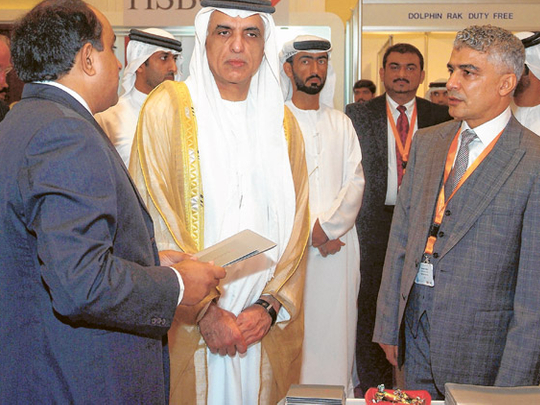
Dubai: The total value of foreign direct investment through UAE free zones has touched Dh268 billion ($73 billion), a top official told participants in a conference Tuesday.
His Highness Shaikh Saud Bin Saqr Al Qasimi, Member of the Supreme Council and Ruler of Ras Al Khaimah, yesterday opened the two-day World Free Zone Convention 2010 in Ras Al Khaimah that started with a call for increased cooperation between the world's free zones to ultimately benefit their clients and remain profitable.
Shaikh Saud said: "The convention comes at an important time when our economic policies are beginning to deliver success and leading to strategic partnerships with key players across the world."
Free zones or export processing zones and specialised economic zones have gained prominence in trade and investment over the last 30 years that help investors bypass a lot of local laws that restrict foreign investment and exports.
"The total value of foreign direct investments (FDI) that have flowed into the UAE [through free zones] has reached approximately Dh268 billion, making us the second most FDI attractive country in the Arab world, according to the UN Conference on Trade and Development (Unctad)," Shaikha Lubna Al Qasimi, Minister of Foreign Trade, said.
Excellent catalyst
"The UAE's free zone model has proved to be an excellent catalyst for development in line with our vision for diversified economic growth."
She added that the UAE ranked 14th globally in the number of new FDI projects in 2009, accounting for 230 projects or 1.7 per cent of the global share of new FDIs, according to Unctad.
"We have been able to successfully grow our projects by 123 per cent in just a span of five years," she said.
In the UAE, foreigners can obtain 100 per cent ownership in businesses. There are 36 free zones serving investors, the majority located in Dubai which hosts the Middle East's largest free zone in Jebel Ali. There are 2,300 zones in 119 developing and transition countries clustered mainly in Asia, the Pacific and the Americas.
Altogether these zones account for $200 billion (Dh734 billion) in gross exports a year and directly employ some 40 million workers and another 60 million indirectly
Oussama Al Omari, CEO and Director General of Ras Al Khaimah Free Trade Zone Authority (RAK FTZ), told Gulf News that more than 200,000 companies registered with free zones generate more than $1 billion of wealth annually.
"We have invested Dh2 billion in RAK FTZ and attracted more than Dh10 billion through 7,500 companies, of which more than 4,000 are still active," he said. "Through this, we have created more than 3,000 jobs in our free zones."
The World Free Zone Convention 2010 is the first of its kind to be held in the Middle East and hosts over 200 international and regional delegates reviewing the opportunities ahead for free zones worldwide in the current economic climate.
Superficial argument
"Many decision-makers in supra-national organisations such as the World Trade Organisation, Unido, Unctad, OECD and the European Commission make the superficial argument that when tariffs disappear, economic incentives for free zones will die and zones will dissolve," Al Omari said.
"They simply do not understand yet that zones have transformed themselves into leading service centres for attracting foreign investment in the world and are greatly needed."
Do you think they offer better opportunities for international entrepreneurs? Do you think they should be abolished entirely?












